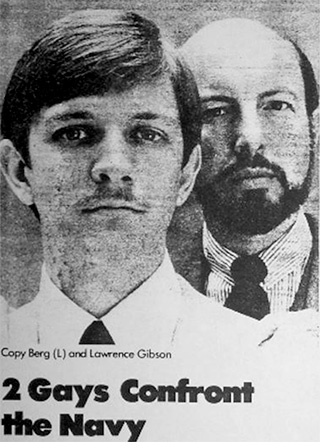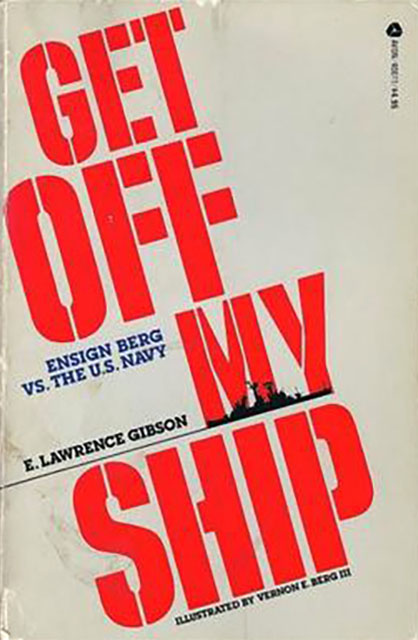© 1981 Rich Grzesiak, all rights reserved.
Vernon Berg III was the first Naval Academy alumnus to actively fight the policies against homosexuality in the services. After Mr. Berg's suit against the US Navy, which had given him an other than honorable discharge as an ensign in 1976, the armed forces adopted a policy of generally granting honorable discharges to homosexuals.
Originally published March 6, 1981.
In an exclusive interview with the Philadelphia Gay News, former Ensign Vernon Berg called his recent settlement of a five-year battle against the United States Navy "a victory."

"I think we've done very well, and the Pentagon is aware of that," he commented in a recent telephone interview about one of the longest, most eloquently fought battles by a gay man against the American military "That one policy change of only honorable discharges (for lesbians and gays) is more than enough to describe the outcome as a victory."
The settlement, reached Jan. 19, ended Berg's case for reinstatement in the Navy after five years of legal efforts through the federal courts. By settling with the Navy, Berg promised to end his legal suit, not to apply for reentry into the military, and not to discuss the amount of cash settlement.
Berg tried to sound sanguine in discussing the settlement. "I suppose in a personal sense I'm satisfied; (the amount) is barely enough to liquidate my debts and break even. Essentially, we decided to settle now rather than continuing the case because there was no likelihood of making any better law (setting any new legal precedents). We had already obtained a change of Defense Department policy of giving only honorable discharges (to lesbians and gays), and that was probably the only significant change we could expect from my court case."
Although the Defense Department must render only honorable discharges, a new DOD regulation announced Jan. 19 mandates the exclusion of all lesbians and gay men from the Armed Forces.
"The case was already five years old," Berg stated, "and we wanted to terminate things before the Reagan administration took over because that would have required the re-initiation of negotiations with a new team of people."

According to Berg, the Defense Department was ultra-sensitive about disclosure of the amount of the cash settlement "because they got a 1ot of criticism from Congress on the settlement with Matlovich ...they're fearful that they'll set a precedent for people who think they might sue for monetary reimbursement."
Berg regards the new DOD regulation on mandatory exclusion of gays as "probably having to face a constitutionality test... it excludes all lesbians and gays without exception."
"The fact is," Berg stated, "that if the military even suspects that you're lesbian or gay, and they want to get rid of you, they may not even discharge you for being gay—they'll find another reason. If a Commanding Officer wants to get rid of someone under his authority there's virtually nothing in the rule books to prevent it from being done. All you need to do is to provide two bad fitness reports in a row and you can be discharged.
"If you come out in the military it'll result in an honorable discharge anyway, so the best advice is to lay low and keep quiet. The military is really pretty good in a laissez-faire way; they won't hunt out homosexuals unless they have some reason to (an arrest, a complaint, etc.). Beyond that there are just too many lesbians and gays in the service to even think about prosecuting all of them."
With the settlement of the Matlovich and Berg cases, a number of legal actions against the military remain, the most prominent of which involves Sgt. Harold Bryant of the Air Force. Bryant was discharged when a man living in his house filed a complaint about his homosexual relationship with a roommate.

Berg said he sees a wholesale change of attitudes toward gays in both officer and enlisted ranks, with a far better chance for new (reinstatement) cases to succeed "Remember that my case started before Anita Bryant, Dade County, Harvey Milk and Jimmy Carter were making national statements on gay rights. At this point my case almost sounds like ancient history."
Would Berg battle the Navy for reinstatement if the case were to begin again? "Oh, sure. I'd almost like to-do it again because I think we could do a better job (against the Navy)."
During the course of the case Berg ended his relationship with his lover, E. Lawrence Gibson, who articulated the entire episode with great vigor (see his Get Ott My Ship for an enlightening summary) (See related story)
Berg admits to no political ambitions ("I know I have the ability but I'm pursuing other goals at this point"), and he today makes his ' home in New York City.
